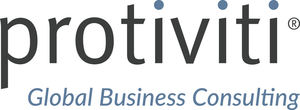Companies Plan to Change Third-Party Vendors that Pose Highest Risks, According to Protiviti and Shared Assessments Survey
New Vendor Risk Management Benchmark Study also finds that while board members' engagement with cybersecurity risks has improved significantly in light of cyberattacks, their level of third-party engagement still lags
MENLO PARK, Calif., Nov. 16, 2017 /PRNewswire/ -- Global consulting firm Protiviti and the Shared Assessments Program's annual Vendor Risk Management Benchmark Study, released today, finds that a majority (53 percent) of organizations surveyed are likely to exit or change (de-risk) relationships with some vendors due to heightened risk levels. The reason cited most often was fourth-party risk issues and an inability to resolve them.
Insurance companies, including healthcare payers, appear much more likely to make de-risking moves, with cost concerns and a lack of internal expertise to evaluate vendor controls cited as other primary reasons. The study, now in its fourth year, finds that 71 percent of these organizations will likely change their high-risk relationships over the next 12 months. Nearly half of all respondents (48 percent) said it has become imperative from a risk and regulatory standpoint to assess vendors' contractors.
The survey of 539 C-suite executives and risk management and audit professionals was conducted across a wide range of industries in the second and third quarters of 2017, with the majority of their organizations having revenues exceeding $1 billion. According to respondents, companies' board-level engagement around cybersecurity risks has improved notably during the past year. Massive and costly cyberattacks – including WannaCry, Petya and the Equifax hack, among others – have struck in the past year, forcing organizations, and healthcare providers in particular, to rethink key components of their vendor risk management approaches.
"While our study revealed increased board engagement in cybersecurity, there is an 'engagement gap' in that boards remain more engaged in their own companies' internal cybersecurity risks than the cybersecurity risks of the organizations' vendors, which can have negative repercussions if even one of those vendors has a severe data breach," said Cal Slemp, managing director, security program and strategy services, Protiviti. New cybersecurity-related regulations, such as the EU's General Data Protection Regulation (GDPR), China's complex Cyber Security Law (CSL) and the stringent New York Department of Financial Services (NYDFS) Cybersecurity Requirements, have taken effect in the past year or are set to go into effect in the near future. "Even though companies have made strides in their vendor risk management practices as evident in this year's survey results, many organizations may not have access to enough vendor risk management expertise to mitigate their risks," added Slemp.
"Despite some improvement in vendor risk management overall, our study has found that – with some notable exceptions – progress has been incremental since the study's first iteration in 2014. The single most important step an organization can take to improve its third-party risk management performance is to undertake periodic, arm's length evaluations of its program's effectiveness. Regular benchmarking is extremely important given the challenges associated with a rapidly evolving, volatile external risk and regulatory environment," said Gary Roboff, senior advisor, The Santa Fe Group, Shared Assessments Program.
The research, which looks at organizations' maturity of vendor risk management, is based on the comprehensive Vendor Risk Management Maturity Model (VRMMM) developed by the Shared Assessments Program.
Resources Available to Learn More
Protiviti will host a complimentary webinar at 10:00 a.m. PST on November 30, 2017 to discuss the results of the survey and offer insights into what organizations can do to raise their vendor risk management maturity levels. Joining Roboff on the one-hour webinar will be Paul Kooney, a director in Protiviti's security and privacy practice. To register, please visit www.protiviti.com/webinars. They have also recorded a podcast about the survey findings, which can be found at www.protiviti.com/vendor-risk. The site also hosts an infographic and a short video of the survey's highlights.
To access a complimentary copy of the full report, 2017 Vendor Risk Management Benchmark Study, please click here.
About the Shared Assessments Program
The Shared Assessments Program is the trusted source for third party risk management with resources, including tools and best practices, to effectively manage the critical elements of the vendor risk management lifecycle. Members represent a collaborative, global, peer community of information security, privacy, and third party risk management leaders in industries including financial services, insurance, brokerage, healthcare, retail, and telecommunications. The Certified Third Party Risk Professional (CTPRP) certification program, membership, and use of the Shared Assessments Program Tools, ensure organizations stay current with the threat and risk environment, including regulations, industry standards, and guidelines. Shared Assessments provides organizations and their service providers the rigorous controls needed for IT, data security, privacy, and business continuity. The Shared Assessments Program is managed by The Santa Fe Group (www.santa-fe-group.com), a strategic consulting company based in Santa Fe, New Mexico. On the web at http://www.sharedassessments.org.
About Protiviti
Protiviti (www.protiviti.com) is a global consulting firm that delivers deep expertise, objective insights, a tailored approach and unparalleled collaboration to help leaders confidently face the future. Through its network of more than 70 offices in over 20 countries, Protiviti and its independently owned Member Firms provide clients with consulting solutions in finance, technology, operations, data, analytics, governance, risk and internal audit.
Protiviti has served more than 60 percent of Fortune 1000® and 35 percent of Fortune Global 500® companies. The firm also works with smaller, growing companies, including those looking to go public, as well as with government agencies. Protiviti is a wholly owned subsidiary of Robert Half (NYSE: RHI). Founded in 1948, Robert Half is a member of the S&P 500 index.
Protiviti is not licensed or registered as a public accounting firm and does not issue opinions on financial statements or offer attestation services.
Editor's note: infographic of survey highlights available in PDF or JPEG formats. Photos available upon request.
SOURCE Protiviti
Related Links
WANT YOUR COMPANY'S NEWS FEATURED ON PRNEWSWIRE.COM?
Newsrooms &
Influencers
Digital Media
Outlets
Journalists
Opted In





Share this article